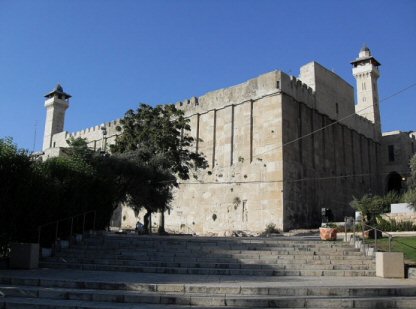Israeli authorities, on Tuesday, closed the Ibrahimi Mosque in Hebron to Palestinians for the second consecutive day during the Jewish new year, said Palestinian Waqf (Endowments) and Religious Affairs Ministry.According to WAFA correspondence, the ministry said in a press statement the Mosque would be closed to Palestinians on Tuesday, so that [Jewish] settlers can celebrate the Jewish new year, ‘Rosh Hashanah’ on the same site.
The ministry explained that the Mosque would also be closed on next Thursday in order to allow (Jewish) settlers to celebrate the Day of Atonement, also known as ‘Yom Kippur’.
The Mosque’s caretaker Munther Abu al-Feilat slammed the Israeli decision to close the Mosque to Palestinians worshippers, while allowing settlers to intrude, as “a blatant disregard to the sentiments of Arabs and Muslims and a serious violation of Palestinians’ freedom to worship as well as human rights conventions.”
He also slammed the decision as “a violation of the sacredness” of the Mosque.
Al-Ibrahimi Mosque is located in the old city of Hebron, few hundred meters away from the part of the city illegally occupied by around 400 extremist settlers, who are protected by about 1,500 Israeli soldiers.
Since 1967, al-Ibrahimi Mosque, like all other Muslim holy sites in Palestine, became a target for the Israeli occupying forces and Zionist settlers, reported the Hebron Rehabilitation Committee.
In 1994, Israel divided al-Ibrahimi Mosque between Muslims and Jews, after an Israeli settler gunned down 30 Palestinians during dawn prayer.
Baruch Goldstein, an Israeli terrorist from the illegal settlement of ‘Kiryat Arba’ settlement, who holds US and Israeli citizenship, opened machine-gun fire at Muslim worshippers during prayer. He killed 30 people and injured 135. On the same day outside the Mosque, the Israeli army opened fire towards fearful and panicky worshippers and killed at least ten civilians.
Following the incident, al-Ibrahimi Mosque was converted into a military post and later divided into two parts, one side for Muslims and the other for Jews. Thus the Mosque became a point of conflict and constant tension that has marred its sanctity.
Nowadays, Israel controls Palestinians’ access to the Mosque, prevents many from praying there on a regular basis and frequently bans the call for prayer under the pretext of disturbing the settlers.
The control is not only restricted to prayer at the Mosque, but also calls for prayers through speakers.

